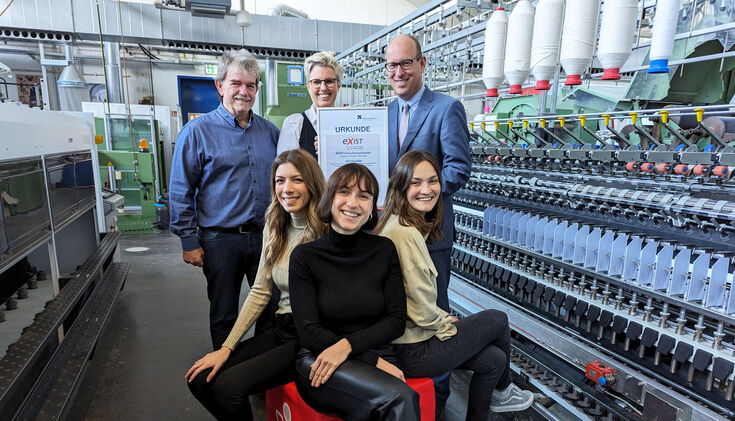From idea to start-up - 1.8 million euros to ex-students for innovative yarn
Mönchengladbach. Swim trunks on, into the water, out again with dry swimwear - sounds utopian, but could soon become reality. The trio of founders of "Octogarn" are currently developing a real innovation: a new type of yarn that could turn the textile industry upside down.
The "Octogarn" project sounds so promising that the former students from The Hochschule Niederrhein (HSNR) and Aachen University of Applied Sciences have received funding of 1.84 million euros. The money comes from the "EXIST - Start-ups from Science" funding program of the Federal Ministry of Economics and Climate Protection.
"Octogarn" is pollutant-free, sustainable, cold-insulating, breathable and friction-reducing. It has a similar effect to the lotus effect and is therefore water-repellent. But it has a decisive added value: it is non-wettable. This means that if a textile made from it is completely submerged in water, it remains dry. "An effect that is hardly known in the textile industry," says Alexandra Plewnia from Mönchengladbach. At the moment, many water-repellent textiles, especially in the technical sector, are produced by finishing them with chemicals such as fluoropolymers. Although green alternatives are more environmentally friendly, they are often not powerful enough. "Octogarn" aims to solve both problems.
The people behind "Octogarn" are all women: Alexandra Plewnia (29), who most recently studied Textile Products at the HSNR, is the idea generator. Sarah Neumann (28) from Cologne, who completed her Master's degree in Management and Entrepreneurship at the FH Aachen on a career-integrated basis, brings business management know-how to the table. From November, the team will be completed by Melanie Jakubik (29) from Duisburg, who studied the same subject as Plewnia and, like her, will be responsible for technology.
Plewnia researched "Octogarn" for around two years as part of her Master's studies in the Faculty of Textile and Clothing Technology. Her interest was piqued when she took the compulsory optional course nanotechnology and focused on the topic of functionality.
She won the "Battle of Ideas" university competition in 2022 with her idea. The 20,000 euros in prize money went directly towards the patent application. Since then, the idea has been presented at many other competitions in Germany.
The HNX team, which advises HSNR students and employees interested in founding a company and supports them as part of the "HNexist" funding program, among other things, also accompanied Plewnia and her team this time. For example, it helped with the extensive application for EXIST. "The combination of this high level of funding and the topic of sustainability is truly unique at our university. This is also an investment in the future!" says Prof. Dr. Dr. Dr. Alexander Prange, HNexist project manager and HSNR Vice President for Research and Transfer.
The yet-to-be-founded start-up wants to produce the yarn and sell it to companies as a supplier. Whether outdoor clothing, protective equipment or use in the shipping industry - thanks to the diverse properties of the material, "Octogarn" can be used in many different ways - and even open up new markets.
The trio is only at the beginning, as the finished yarn is not yet available. The 1.84 million euros will therefore help enormously to develop a prototype by the end of the funding period in February 2026.
The funding will be used primarily for personnel expenses, but a new machine will also be purchased. For the development of Octogarn, the founding team is allowed to use office space and machines from the Faculty of Textile and Clothing Technology. Plewnia: "The HSNR has excellent machinery. Everything you learn can also be put into practice here."
"'Without courage, knowledge is barren' - as Baltasar Gracián y Morales once said. A quote that applies perfectly to this dedicated team!" says Prof. Dr. Robert Groten, head of the "Octogarn" project.
"You need a lot of patience and very good planning, but it's an absolute affair of the heart," says Sarah Neumann from Cologne.



















